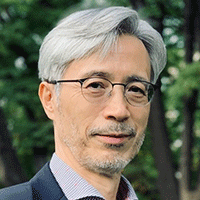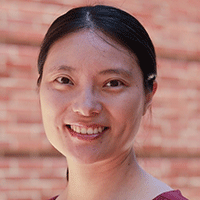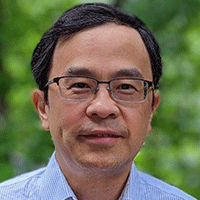Rayleigh Lecture
Wednesday, November 1
4:00PM-5:30PM, Room 389, Convention Center

Yoon Young Kim
Seoul National University
Lecture Title: Harnessing Elastic Waves: The Power and Potential of Metamaterials
Abstract: In this lecture, we delve into the intriguing realm of elastic metamaterials and their remarkable potential for the revolutionary manipulation of elastic waves in solids, ranging from perfect mode conversion between longitudinal and transverse waves to extraordinary sensing and actuation enhancement of ultrasonic waves. Exotic effective material properties are needed for the cutting-edge wave manipulation, and they can only be achieved with metamaterials. With an emphasis on both theoretical underpinnings and practical implications, this talk seeks to kindle the audience's interest in the captivating and still uncharted field of elastic metamaterials.
Biography: Yoon Young Kim is a Professor at Seoul National University's Department of Mechanical Engineering, currently holding the title of Distinguished Professor. He earned his B.S. and M.S. degrees from Seoul National University and later achieved his Ph.D. from Stanford University. After joining Seoul National University in 1991, Professor Kim achieved the prestigious distinction of becoming the department's first Distinguished Professor in 2021. Throughout his career, he has specialized in mechanics and design with a keen focus on elastic metamaterials, topology optimization of rigid-body mechanisms, and advanced beam analysis. Recently, Professor Kim has authored two notable books: "Elastic Waves and Metamaterials: The Fundamentals" (Springer, 2023), which delves deep into the rudimentary concepts of waves and metamaterials and highlights metamaterial applications rooted in his theory of perfect elastic wave mode conversion, and "Theory of Thin-Walled Beams" (Springer, 2023), which introduces his original higher-order theory. Over the years, Professor Kim's contributions to the field have been acknowledged through numerous awards, such as the JSCES (Japan Society for Computational Engineering and Science) Grand Prize in 2022, the Korean National Medal of Science and Technology in 2021, the Mechanical Engineer of the Year in 2019, and the SNU (Seoul National University) Research Excellence Award in 2017. He is a member of the Korean Academy of Science and Technology and also a member of the National Academy of Engineering, Korea. In addition to his academic achievements, he has extended his expertise to the industry, consulting for tech companies like Samsung Electronics Co. and SEMES.
Materials Division Awards Symposium and Reception
Wednesday, November 1
3:00PM-6:00PM, Room 395, Convention Center

2023 Sia Nemat-Nasser Early Career Awardee
Dr. Lihua Jin
Associate Professor
Mechanical and Aerospace Engineering
UCLA
She is recognized for unraveling coupled non-equilibrium processes in stimuli-responsive soft materials to achieve programmable shape morphing and actuation, developing novel mechanical metamaterials for reusable energy absorption and reversible shape transformation, and providing mechanistic understanding of stretchability of electronic materials and devices. Before joining UCLA she was a postdoctoral scholar at Stanford University. She obtained her PhD degree in Engineering Sciences from Harvard University. Prior to that, she earned her Bachelor’s and Master’s degrees from Fudan University. Lihua conducts research on mechanics of soft materials, stimuli-responsive materials, instability and fracture, soft robotics, and biomechanics. She has published over 70 peer-reviewed journal papers. Lihua was the winner of Haythornthwaite Research Initiative Grant from ASME, Extreme Mechanics Letters Young Investigator Award, Hellman Fellowship, NSF CAREER Award and ACS PMSE Early Investigator Award. She has organized symposia in multiple major conferences, and is currently the secretary for the ASME technical committee of mechanics of soft materials.

2023 Orr Early Career Awardee
Dr. Grace X. Gu
Assistant Professor
Mechanical Engineering
University of California, Berkeley
She is recognized for her contributions to computational and experimental fracture mechanics, with a focus on bioinspired composites and architected materials for applications from body armor to lightweight aerospace structures. She received her PhD and MS in Mechanical Engineering from the Massachusetts Institute of Technology and her BS in Mechanical Engineering from the University of Michigan, Ann Arbor. Her current research focuses on creating new materials with superior properties for mechanical, biological, and energy applications using multiphysics modeling and artificial intelligence, as well as developing intelligent additive manufacturing technologies to realize complex material designs. Dr. Gu is the recipient of several awards, including the Sloan Research Fellowship, TMS Early Career Faculty Fellow Award, ONR Young Investigator Award, ASME AMD Haythornthwaite Research Initiation Award, ACS PMSE Young Investigator Award, DARPA Young Faculty Award, and SME Outstanding Young Manufacturing Engineer Award. She has co-organized symposia at several conferences and serves on the advisory boards of Advanced Intelligent Systems, MRS Communications, and Materials Horizons.
2023 Orr Early Career Award Lecture
The Orr Family Early Career Award is to recognize early career research excellence within 7 years of terminal degree in the areas of experimental, computational, or theoretical fatigue, fracture, or creep.
Lecture Title: Symmetry is meant to be broken: Exploring the impact of disrupted symmetry in architected materials
Abstract: The principle of symmetry has served as a foundational element in the design and optimization of materials, influencing their mechanical, thermal, and electrical properties. Yet, breaking away from this convention by deliberately disrupting symmetry within materials can result in unexpected and interesting phenomenon. This talk will delve into the role of symmetry, and the implications when it is disrupted within architected material designs. First, we will explore the effects of this symmetry disruption within composite materials, bringing insights into unique fracture behaviors and enhanced defect tolerance. Second, we will investigate ordered and disordered cellular materials, balancing the classic conflict between strength and toughness. Lastly, we will discuss the influence of symmetry-breaking in piezoelectric metamaterials, where macroscopic momentum and electric stimuli form an unusual alliance, termed as 'electro-momentum coupling'. It is envisioned that our findings will provide new understandings for designing the next generation of materials, equipped with unprecedented properties and functionalities. We will also discuss potential future research directions and remaining challenges in this field.

2023 Centennial Mid-Career Awardee
Dr. Ting Zhu
Woodruff Professor, Woodruff School of Mechanical Engineering
The Georgia Institute of Technology
He earned his Ph.D. in Mechanical Engineering from the Massachusetts Institute of Technology in 2004. Prior to joining Georgia Tech in 2005, he was a postdoctoral associate at Harvard University. His research centers around solid mechanics and materials modeling. He has been honored with the Sia Nemat-Nasser Early Career Award from the American Society of Mechanical Engineers and the Young Investigator Medal from the Society of Engineering Science.
2023 Centennial Mid-Career Award Lecture
The Centennial Mid-Career Award is given to a researcher between 10 and 20 years of his/her terminal degree who has made impactful contributions in a technical area at the interface of materials and mechanics.
Lecture Title: Mechanics of Extremely Heterogeneous Materials
Abstract: Our recent studies of 3D-printed alloys (Nature, 608, 62–68, 2022), high-entropy alloys with nanoscale chemical modulation (Nature, 574, 223-227, 2019), gradient nanotwinned metals (PNAS, 119, e2116808119, 2022), and several other heterogeneous materials raise fundamental questions regarding the role of extremely fine microstructural heterogeneities in controlling the mechanical behavior of these novel material systems. We combine mechanics modeling and experimental characterization to unravel the extra strengthening effects of microstructural gradients relative to their homogeneous counterparts. Quantitative comparisons are made between modeling and experimental results, highlighting the less appreciated notions of back-stress hardening with different types and at different deformation stages in materials with extremely complex microstructural heterogeneities. Additionally, we have developed new experimental approaches, including in situ atomic resolution TEM (Science, 375, 1261–1265, 2022) and in situ synchrotron micro-diffraction X-ray (PNAS, 115, 483-488, 2018), to push the limits of characterizing heterogeneous microstructures at different length scales. These techniques enable us to gain mechanistic insights for further enhancing the strength-ductility synergy in the design of extremely heterogeneous materials.

2023 Nadai Medal Awardee
Dr. Nancy Sottos
Maybelle Leland Swanlund Endowed Chair Professor
Head of the Department of Materials Science and Engineering
University of Illinois Urbana Champaign
She is being recognized for her pioneering contributions to the development of self-healing polymers and composites. She is leader of the Autonomous Materials Systems (AMS) group at the Beckman Institute for Advanced Science and Technology and director of the University of Illinois spoke of the BP International Center for Advanced Materials. Sottos is also a co-founder of the start-up companies Autonomous Materials Inc. (AMI) and RapiCure Solutions. The Sottos group develops polymers and composites capable of self-healing and regeneration, self-reporting, and self-protection to improve reliability and extend material lifetime. Her current research interests focus on circular additive and morphogenic manufacturing strategies for polymeric and composite materials with programmed end of life. She is a member of the National Academy of Engineering, the National Academy of Sciences, and the American Academy of Arts and Sciences. She is also a Fellow of the Society for Experimental Mechanics, the Society for Engineering Science and the American Association for the Advancement of Science.
2023 Nadai Medal Lecture
The Nadai Medal is awarded in recognition of significant contributions and outstanding achievements broadening the field of materials engineering.
Lecture Title: Regenerative Energy-Efficient Manufacturing of Thermoset Polymeric Materials
Abstract: Energy efficient manufacturing of thermoset polymers and polymer-based composites with realistic end-of-life strategies presents one of the most significant scientific and societal challenges for this century. Thermoset polymers and composites possess the necessary chemical and mechanical properties critical for achieving lightweight, durable structures in the energy (wind turbine blades), aerospace (aircraft and drones), and transportation industries (electric vehicles and trains), but the vast energy input required for initial manufacture (Gigajoules), long cure times to develop desired structural properties (hrs), and lack of end-of-life strategies render these materials unsustainable. Given increasing environmental concerns surrounding both the production and disposal of thermoset polymers, transformative strategies are required for sustainable low-energy manufacturing and end-of-life management. This talk will describe research into thermoset resin formulations that enable (i) closed-loop controlled, energy-efficient additive manufacturing via frontal polymerization; (ii) the development of nascent morphogenic manufacturing strategies that enable control over polymer structure and properties and, (iii) programmed end-of-life upcycling and multifunctionality for (re)use in structural materials.